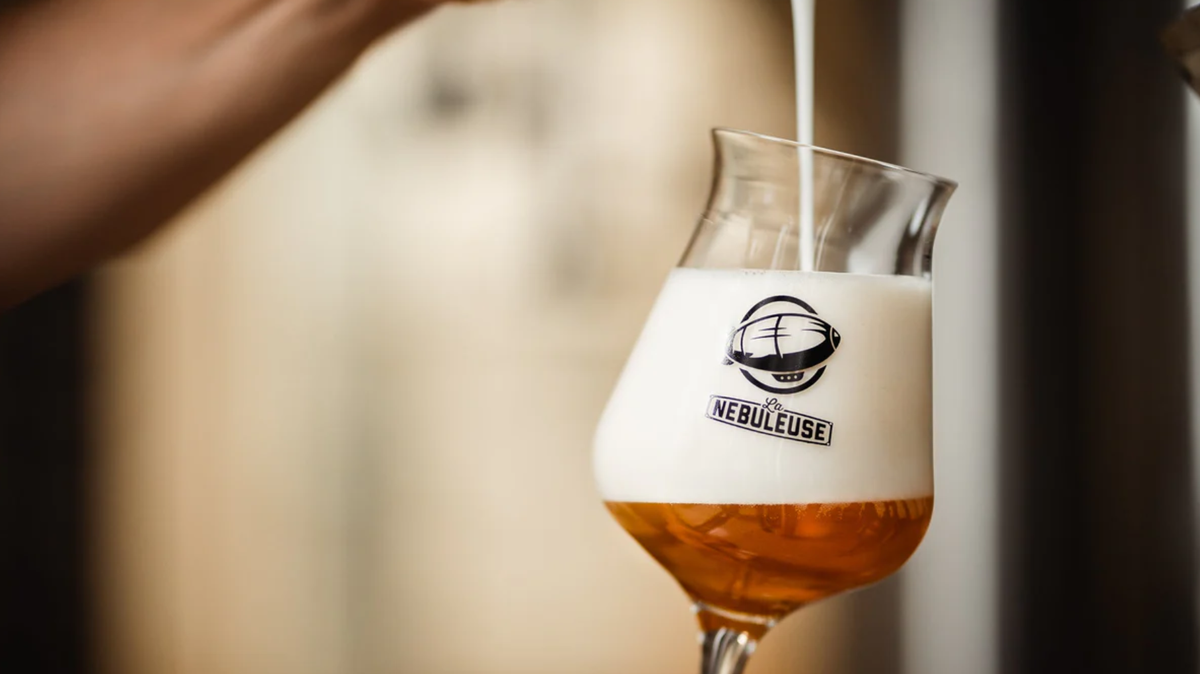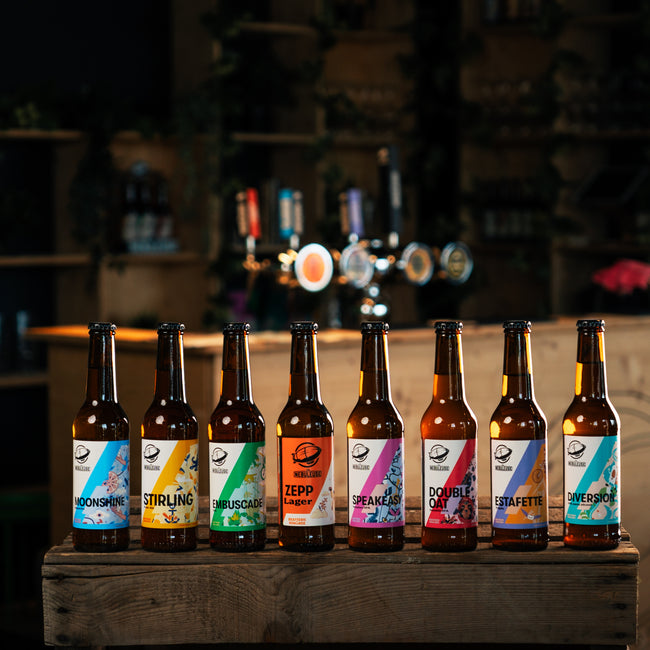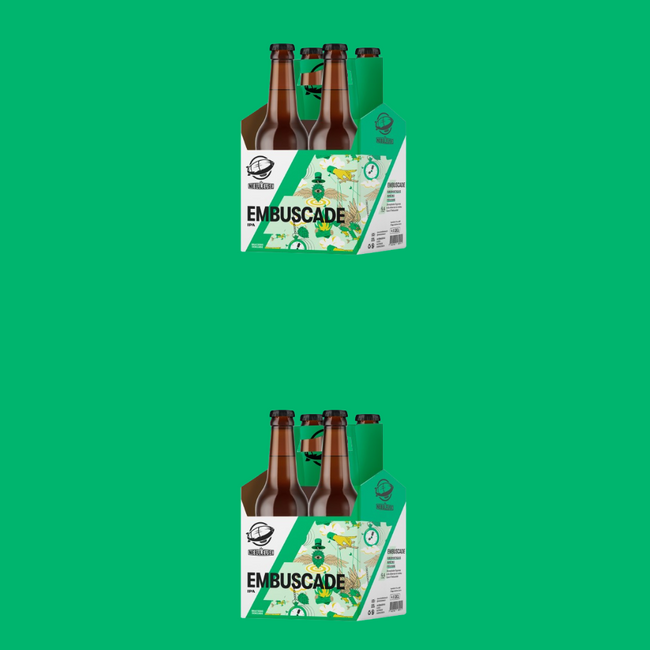Is craft beer really healthier than industrial beer?

Your body already knows what your brain refuses to admit. With every sip, your taste buds detect this subtle but fundamental difference between artisanal and industrial brews. But beyond taste, what really lies within these two brewing worlds?
A nutritional titanic battle in your glass: We dissect what science reveals about these diametrically opposed philosophies, without jargon or cheesy marketing. Spoiler alert: your body has probably already chosen a side, but we're going to explain why with solid arguments rather than empty promises.
Why does craft beer use 4 ingredients and industrial beer 15?
Let's start by opening the hood. On one side, a craft beer proudly displays its four to five ingredients: water, malt, hops, yeast. Period. On the other, an industrialist reveals a list that reads like an organic chemistry course: stabilizers, preservatives, clarifying agents, hop extracts, corn syrups, and so on.
This fundamental difference isn't cosmetic. The additives and preservatives widely used in industrial beers primarily serve a cost-effective purpose: extending shelf life, standardizing taste, and reducing production costs. Your liver, on the other hand, must decode this complex chemistry.
Conversely, we take a radically different approach to our ingredient selection . Each component has a specific function, nothing is superfluous. It's like comparing a grandmother's recipe to a commercial dish: same apparent result, totally different process.
The example of our gluten-free Stirling beer
Our gluten-free Stirling perfectly illustrates this philosophy. We use alternative grains like quinoa and millet, true nutritional powerhouses. Quinoa provides essential amino acids that your body can't synthesize on its own, while millet offers exceptional mineral richness. This inclusive approach doesn't compromise on taste; quite the opposite: it opens up new nutritional possibilities.
The water we use is treated with the same meticulousness as a pharmaceutical laboratory. Each mineral is precisely measured to reveal the full potential of our other ingredients, whereas manufacturers standardize for mass production.
Natural fermentation keeps nutrients alive
This is where the magic happens—or not. The natural fermentation we practice lasts several weeks, allowing the yeasts to meticulously transform sugars into alcohol while preserving a vibrant microbial ecosystem. The yeasts remain alive and active, creating natural probiotics that enrich your gut microbiota.
In contrast, industrial beer undergoes systematic pasteurization. This intense heat treatment kills everything: bad bacteria, of course, but also beneficial yeasts, fragile B vitamins, and active enzymes. It's the equivalent of surgical sterilization applied to a living product.
The positive impact on your digestion
This difference directly impacts digestibility. Unpasteurized beers like ours retain their natural enzymes, which facilitate digestion. Many of our customers report superior digestive comfort with our creations compared to industrial beers.
Our moonshine demonstrates this approach. This authentic Belgian white beer preserves all the protein richness of wheat through respectful fermentation. Vitamins B1 and B6 remain naturally concentrated, unlike industrial versions where they are often destroyed and then synthetically reintroduced.
The fermentation temperature, which we precisely control, directly influences the profile of both aromatic and nutritional compounds. Overly rapid fermentation, as in industrial processes, generates unwanted by-products and impoverishes the final vitamin spectrum.
What craft beer really retains more
The numbers speak for themselves. Unpasteurized craft beer retains up to 80% of its natural B vitamins , essential for energy metabolism and the nervous system. Industrial beer, after pasteurization and intensive filtration, loses most of them.
The antioxidants naturally present in the quality hops we select remain bioactive. These phenolic compounds fight free radicals and have recognized anti-inflammatory properties. Industrial extraction using chemical solvents destroys many of these valuable molecules.
Natural minerals are better absorbed by your body
The authentic minerals in artisanal malt— magnesium, potassium, and phosphorus —retain their natural bioavailability. In industrial malt, they are often replaced by synthetic equivalents that are less easily absorbed by the body.
And for those who prefer to avoid alcohol? Our 0.5% Diversion range and our brand new 2.5% Alternative offer all the nutritional benefits of craft processes without the drawbacks of ethanol. Artisanal fermentation, natural ingredients, zero compromise on quality.
Regarding calories, contrary to popular belief, it's not the production method that determines energy intake, but the style and recipe. Our total transparency on ingredients allows for a truly informed choice, whereas manufacturers rely on opacity.
Moderate and responsible consumption obviously remains the golden rule, regardless of the type of beer. Public Health France recommends "a maximum of two glasses per day, not every day," with a maximum of ten glasses per week.
In conclusion, craft beer is nutritionally superior.
From a nutritional perspective, it's undeniable. More preserved vitamins, active antioxidants, and natural probiotics than industrial versions. Fewer synthetic additives, preservatives, and stabilizers. Improved digestibility thanks to long fermentation and live yeasts.
But beware of dangerous shortcuts. "Nutritional superior" in no way means "health product." We are still in the world of alcoholic beverages, with their addictive potential and inherent health risks. Alcohol is still alcohol, whether craft or industrial.
The next time you're wondering what to buy, remember: choosing craft beer is choosing respect—respect for the ingredients, the processes, and the person enjoying it. But most importantly, it's choosing moderation.
Cheers 🍻
Responsible consumption: This article compares the nutritional aspects of craft and industrial beers, but does not constitute medical advice. Alcohol abuse is dangerous for your health. In cases of pregnancy, driving, or health problems, abstinence remains the only safe option. Consult your doctor for personalized medical advice.








